
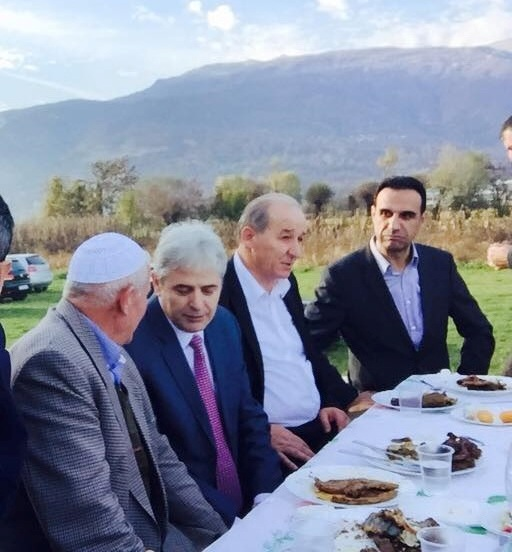
Emruli (on the right) enjoying a working lunch with his friends from the Democratic Union for Integration.
Party leader Ali Ahmeti is second from the left.
In this part we plan to take a look at the domestic political connections of Safet Emruli, the former Director of the North Macedonian State Office for Intellectual Property (SOIP).
"In Emruli's case as we shall see later, this seems to have been money well spent."It's a matter of public record that Emruli, who belongs to North Macedonia's ethnic Albanian minority, is a full-blooded "party-political animal" and a paid-up member of the Democratic Union for Integration (DUI), the largest ethnic Albanian political party in the country.
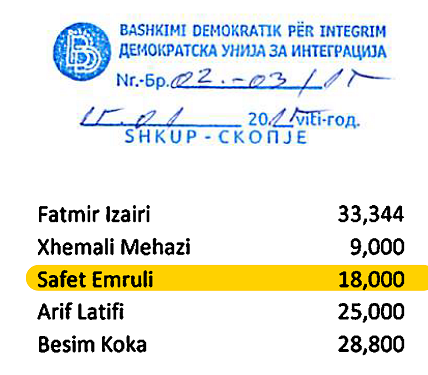
Excerpt from the DUI accounts (2014) [PDF] showing payment of membership dues for Emruli (18,000 MKD).
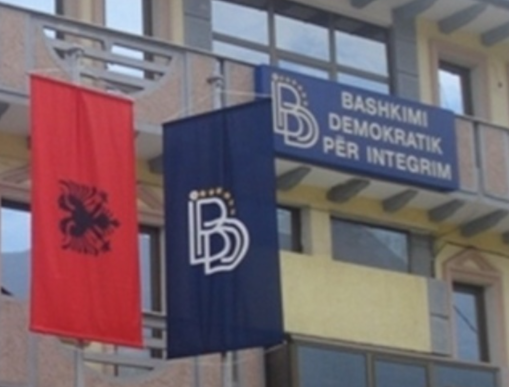
The Albanian flag - rather than the Macedonian one - flies in front of the DUI party headquarters in Skopje.
"In reality, however, the inter-ethnic tensions in the country were far more entrenched and problematic than officially admitted."In 1991, Macedonia voted to secede from the Yugoslav Federation and became fully independent without a single shot being fired. At that time the view prevailed that - in contrast to Kosovo or Bosnia - no major inter-ethnic tensions would develop in the fledgling state.
In reality, however, the inter-ethnic tensions in the country were far more entrenched and problematic than officially admitted. In general, there was very little social contact between Macedonians and Albanians. Having different languages and different religions, they each tended to live primarily in their own parallel world with little or no mutual interaction.
"In general, there was very little social contact between Macedonians and Albanians."Ethnic (Slav) Macedonians were concerned about secessionist tendencies among Albanians, many of whom were suspected of being sympathetic to proposals for the creation of Greater Albanian state, encompassing present-day Albania, Kosovo and Albanian dominated areas of Macedonia.
Ethnic Albanians, for their part, often felt that they were treated as second-class citizens, because, notwithstanding the equal rights clause in the Constitution, they were heavily under-represented in the civil service and in leading positions in society.
"Ethnic (Slav) Macedonians were concerned about secessionist tendencies among Albanians, many of whom were suspected of being sympathetic to proposals for the creation of Greater Albanian state, encompassing present-day Albania, Kosovo and Albanian dominated areas of Macedonia."The level of discontent in the Albanian community increased dramatically during the late 1990s as a result of a series of repressive measures imposed by the government, including restrictions on the official use of the Albanian language and a ban on the display of the Albanian flag.
In late 2000, Albanian groups consisting of veterans of the Kosovo conflict began to penetrate across the border into western Macedonia and form a local division of the pan-Albanian paramilitary organisation known as the Ushtria Ãâ¡lirimtare Kombëtare (UÃâ¡K) or "National Liberation Army" (NLA). Their efforts were supported by many young Albanian men from villages in the border area who were disaffected with the Macedonian state.
In early 2001, the NLA occupation of Tanusevci, an ethnic Albanian village on Macedonia’s northern border, and armed confrontations between the NLA and Macedonian security forces in the region of Tetovo and Kumanovo, ushered in a new phase of inter-ethnic conflict, commonly referred to as the "Albanian insurgency". There were claims that the NLA wished to see Albanian-majority areas secede from the country but high-ranking members of the group have denied this.
"...DUI has managed to establish itself as the largest ethnic Albanian political party in North Macedonia and the third largest political party in the country."The short-lived "Albanian insurgency" ended with the Ohrid Framework Agreement, signed on 13 August 2001.
Following the adoption of the Ohrid Framework Agreement, the Democratic Union for Integration (DUI) - in Albanian: Bashkimi Demokratik për Integrim (BDI) - was formed on 5 June 2002 under the leadership of the former NLA guerrilla leader, Ali Ahmeti, who remains at the head of the party to this day.
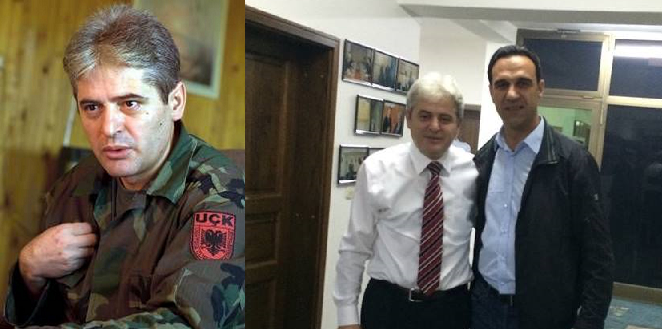
Left: Former guerrilla leader turned politician, Ali Ahmeti who now leads the DUI.
Right: Ahmeti with DUI party comrade Emruli.
"The party leader Ahmeti is in his element on occasions like Albanian National Flag Day, which commemorates the Albanian declaration of independence on 28 November 1912."Given its historical roots in the "Albanian insurgency" of 2001 and its links to the NLA, it's not surprising that the DUI likes to indulge in ultra-nationalist rhetoric, including emotional invocations of "the martyrs of the Albanian nation".
The party leader Ahmeti is in his element on occasions like Albanian National Flag Day, which commemorates the Albanian declaration of independence on 28 November 1912.
At such events he likes to harangue the party faithful and remind his audience that "the red and black flag … is a flag of all Albanians, which has been washed in blood and the sacrifice of the sons and daughters" and that there is "no freedom and equality without blood".
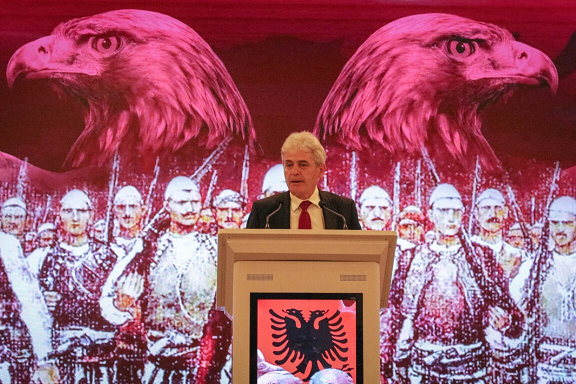
DUI leader Ali Ahmeti haranguing the party faithful on Albanian National Flag Day, 28 November 2020.
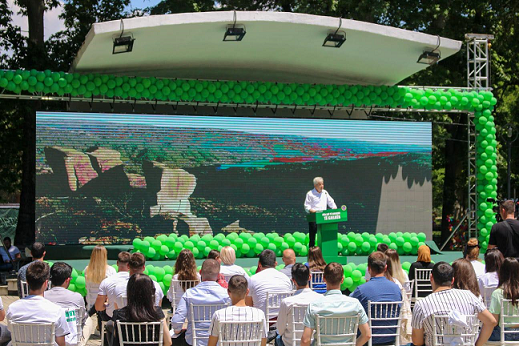
Ahmeti's recent attempts to "greenwash" the DUI have been greeted with scepticism in many quarters
"This somewhat clumsy attempt at "greenwashing" was greeted with scepticism and ridicule in many quarters."Whatever one is inclined to make of the DUI, it has to be acknowledged that since its formation in 2002 it has managed to establish itself as a significant player in the political life of North Macedonia.
In the next part we will look at the party's role as the local parliamentary "kingmaker" and see how Emruli's professional career has benefited from his DUI connections. ⬆